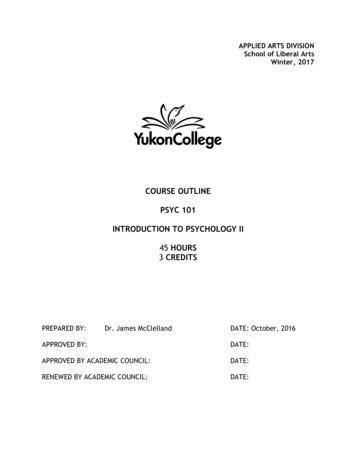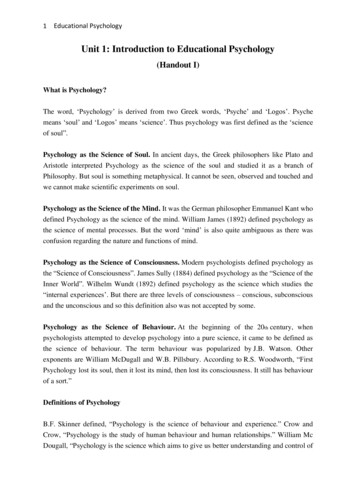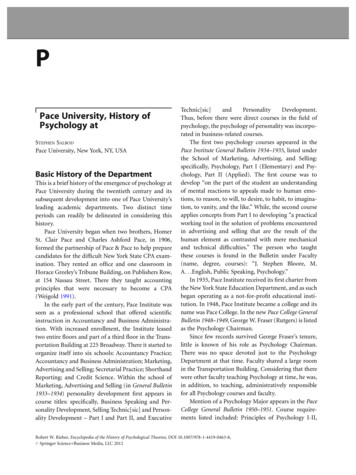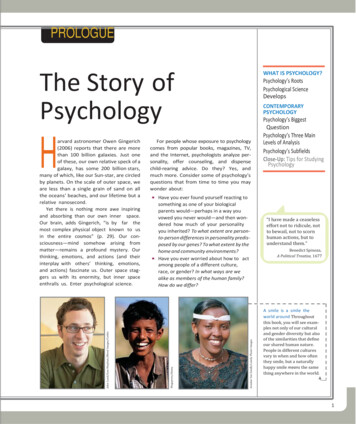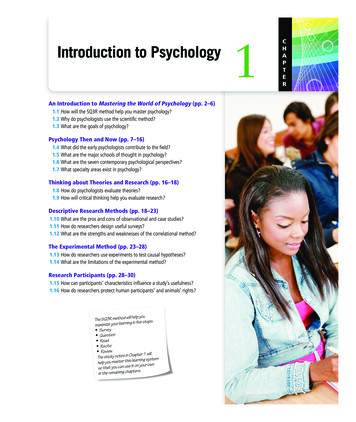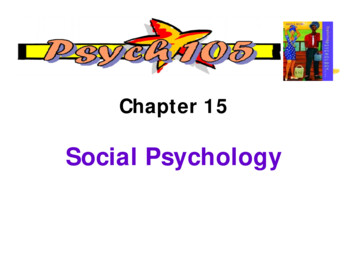
Transcription
Chapter 15Social Psychology
Social Thinking Social Psychology scientific study of how we think about,influence, and relate to one another Attribution Theory tendency to give a causal explanation forsomeone’s behavior, often by crediting eitherthe situation or the person’s disposition
Social Thinking Fundamental Attribution Error tendency for observers, when analyzinganother’s behavior, to underestimate theimpact of the situation and to overestimatethe impact of personal disposition Attitude belief and feeling that predisposes one torespond in a particular way to objects, peopleand events
Social Thinking Our behavior is affected by our inner attitudesas well as by external social ior
Social Thinking Attitudes followbehavior Cooperativeactions feedmutual liking
Social Thinking Foot-in-the-Door Phenomenon tendency for people who have first agreed toa small request to comply later with a largerrequest Role set of expectations about a social position defines how those in the position ought tobehave
Social Thinking Cognitive Dissonance Theory we act to reduce the discomfort (dissonance)we feel when two of our thoughts(cognitions) are inconsistent example- when we become aware that ourattitudes and our actions clash, we can reduce theresulting dissonance by changing our attitudes
Social Thinking Cognitive dissonance
Social Influence Conformity adjusting one’s behavior or thinking tocoincide with a group standard Normative Social Influence influence resulting from a person’s desire togain approval or avoid disapproval
Social Influence Asch’s conformity experiments
Social Influence Informational Social Influence influence resulting from one’s willingness toaccept others’ opinions about reality
Social Influence Milgram’s follow-up obedience experiment
Social Influence Some individuals resist social coercion
Social Influence Social Facilitation improved performance of tasks in thepresence of others occurs with simple or well-learned tasks butnot with tasks that are difficult or not yetmastered Social Loafing tendency for people in a group to exert lesseffort when pooling their efforts towardattaining a common goal than whenindividually accountable
Social Facilitation
Social Influence Deindividuation loss of self-awareness and selfrestraint in group situations thatfoster arousal and anonymity
Social Influence Group Polarization enhancement of a group’s prevailingattitudes through discussion within thegroup Groupthink mode of thinking that occurs when thedesire for harmony in a decision-makinggroup overrides realistic appraisal ofalternatives
Social Influence If a group islike-minded,discussionstrengthens itsprevailingopinions
Social Relations Prejudice an unjustifiable (and usually negative) attitudetoward a group and its members involves stereotyped beliefs, negative feelings,and a predisposition to discriminatory action
Social Relations Stereotype a generalized (sometimes accurate, but oftenovergeneralized) belief about a group of people Discrimination unjustifiable negative behavior toward a groupor its members
Social Relations Does perception change with race?
Social Relations Americans today express much less racialand gender prejudice
Social Relations Ingroup “Us”- people with whom one shares acommon identity Outgroup “Them”- those perceived as different or apartfrom one’s ingroup
Social Relations Ingroup Bias tendency to favor one’s own group Scapegoat Theory theory that prejudice provides an outlet foranger by providing someone to blame Just-World Phenomenon tendency of people to believe the world is just people get what they deserve and deservewhat they get
Social Relations Vivid cases (9/11 terrorists) feed stereotypes
Social Relations Aggression any physical or verbal behavior intended tohurt or destroy Frustration-Aggression Principle principle that frustration – the blocking of anattempt to achieve some goal – createsanger, which can generate aggression
Social Relations
Social Relations Men whosexuallycoercewomen
Social Relations Conflict perceived incompatibility of actions, goals, orideas Social Trap a situation in which the conflicting parties, byeach rationally pursuing their self-interest,become caught in mutually destructivebehavior
Social RelationsPerson 1Person 2Choose BChoose AChoose AChoose BOptimaloutcomeProbableoutcome Social trap by pursuingour selfinterest andnot trustingothers, we canend up losers
Social RelationsAttractiveness Mere Exposure Effect repeated exposure to novel stimuli increasesliking of them Conceptions of attractiveness vary byculture
Social Relations Passionate Love an aroused state of intense positiveabsorption in another usually present at the beginning of a loverelationship Companionate Love deep affectionate attachment we feel forthose with whom our lives are intertwined
Social Relations Equity a condition in which people receive from arelationship in proportion to what they give toit Self-Disclosure revealing intimate aspects of oneself toothers Altruism unselfish regard for the welfare of others
Social Relations Bystander Effect tendency forany givenbystander to beless likely togive aid if otherbystanders arepresent
Social Relations The decision-making process forbystander intervention
Social Relations Social Exchange Theory the theory that our social behavior is anexchange process, the aim of which is tomaximize benefits and minimize costs Superordinate Goals shared goals that override differencesamong people and require their cooperation
Social Relations Graduated and Reciprocated Initiatives inTension-Reduction (GRIT) a strategy designed to decrease internationaltensions one side announces recognition of mutual interestsand initiates a small conciliatory act opens door for reciprocation by other party
Social Psychology. Social Thinking Social Psychology scientific study of how we think about, influence, and relate to one another Attribution Theory tendency to give a causal explanation for someone’s behavior, often by cr



